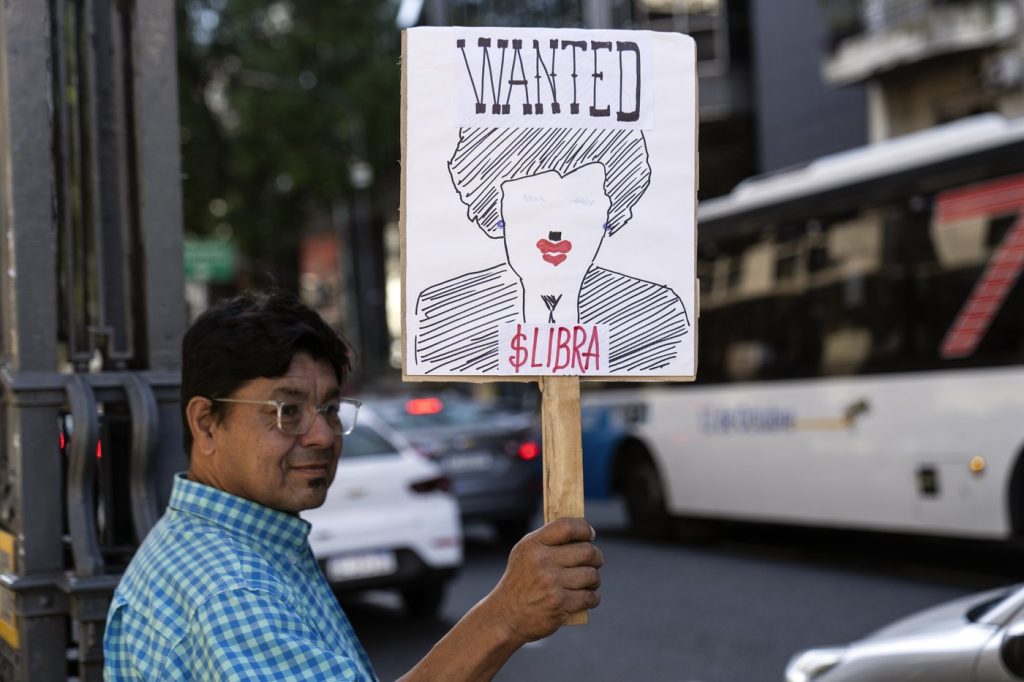Argentina's President Javier Milei is currently embroiled in a corruption investigation regarding his promotion of a highly speculative cryptocurrency known as a meme coin. This controversy, which has been termed "cryptogate," has gained traction following the recent trend of such cryptocurrencies, especially after notable figures like former President Donald Trump and his wife introduced their own tokens.
The scandal has seen the involvement of various stakeholders, including a U.S. influencer, a crypto developer identified by the pseudonym "Meow," and American entrepreneur Hayden Davis, who claims to have assisted in launching Melania Trump's meme coin last month. The public is now eager to understand the timeline of events surrounding this incident and its implications for Milei's administration.
Meme coins are essentially cryptocurrencies that play off internet memes, viral moments, or celebrities without offering significant technological advancements or solutions to existing problems. Names like Dogecoin and Fartcoin exemplify the lighthearted nature of these coins. While critics often categorize them as digital Ponzi schemes benefiting insiders at the expense of retail investors, some advocates argue that meme coins could represent pioneering ways in which the internet might reshape financial and transactional systems.
In the wake of Milei's announcement about the $LIBRA meme coin, promoted as an initiative aimed at fueling economic growth and supporting small businesses, the price of the coin surged almost instantaneously, achieving a market value of over $4 billion. However, this initial spike was short-lived; early investors quickly began selling off their holdings, leading to a rapid collapse in value that displayed typical signs of a "rug pull." Such occurrences are common in the realm of meme coins, where insiders take advantage of early momentum to cash out, leaving newer investors to incur substantial losses.
Upon the price's plummet, Milei retracted his initial promotion on social media and distanced himself from the coin, prompting dozens of criminal complaints to be filed. In response, a judge was appointed to investigate fraud allegations, while Argentina's main opposition party called for Milei's impeachment. He has, however, maintained that he acted in good faith and requested an investigation from the Justice Ministry's Anti-Corruption Office to verify if any wrongdoing occurred by him or others involved.
Hayden Davis, who is viewed as a key figure in the scandal and described as an adviser to Milei, asserted that the $LIBRA was not intended as a rug pull but rather an experiment to demonstrate the utility of digital currencies in line with Milei's vision of positioning Argentina as a hub for innovation. Davis also admitted to his connection with Melania Trump's meme coin, which similarly experienced a rapid rise and fall in value shortly after its launch.
Another notable figure is Dave Portnoy, a prominent online influencer and founder of the Barstool Sports podcast empire, who stated that Davis had informed him about the $LIBRA launch prior to making it public and encouraged him to promote the coin. After investing based on Milei's subsequent social media endorsement, Portnoy faced losses when the price of the coin dropped. In response, Davis claimed to have reimbursed Portnoy's losses. Meanwhile, "Meow," the anonymous co-founder of a company involved in launching meme coins, asserted that no insiders engaged in any wrongdoing but revealed that an internal resignation took place due to a demonstrated "lack of judgment" regarding the incident.
This scandal marks the first significant crisis of Milei's presidency and could potentially undermine public confidence in him. According to a recent poll conducted by Zuban Cordoba and Associates, nearly 67% of respondents labelled cryptogate as the most critical crisis of Milei's administration, while over 83% suggested that he should cease utilizing social media to promote such projects. These sentiments raise concerns about how this situation may influence the administration’s relationship with foreign investors, especially as the government seeks to relax currency controls and negotiate loans with the International Monetary Fund at a crucial time.
Despite the controversies, the landscape for meme coins appears impervious to long-term decline. Their track record, characterized by rapid fluctuations in value, serves as a caution for both investors and creators. Recent meme coins promoted by other public figures have similarly witnessed dramatic post-launch declines, mirroring Milei's experience. It is evident that as the cryptocurrency environment continues to evolve, the associated risks remain just as pronounced.










